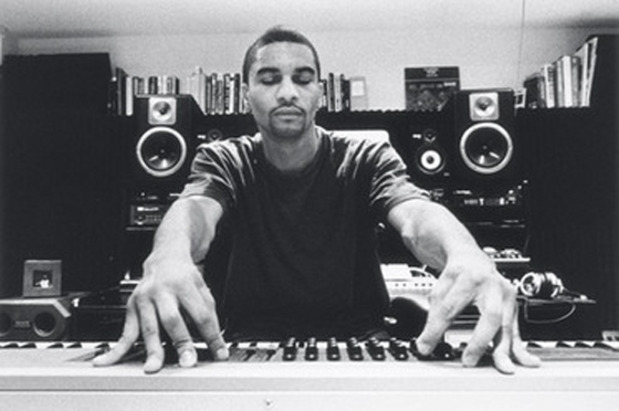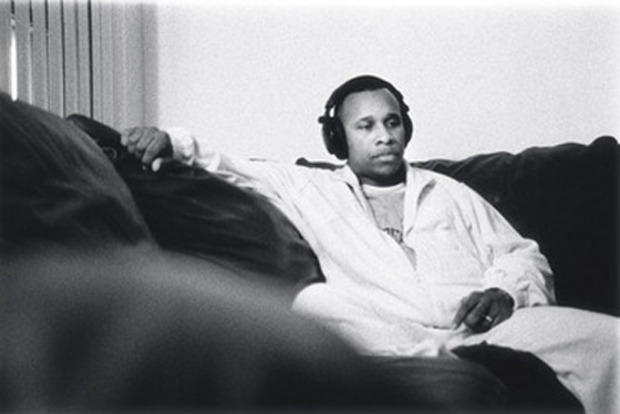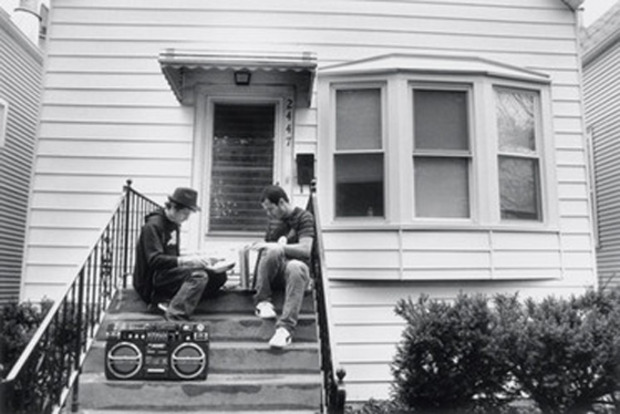Chicago’s Dan Ryan Expressway has been undergoing heavy repairs for the past few years, and the construction makes rush hour a slow crawl at best. Traffic got so bad that the Illinois Department Of Transportation sent drivers to avoidthedanryan.com to find alternate routes—but if you’re only discovering that from a flashing billboard while inching your rental towards the blocked-up exit on Diversey that MapQuest gave you, it doesn’t do much good. Fortunately, DJ Nehpets is just kicking off his 7PM slot on Power 92 with the sampled Too $hort hook from Shawnna’s “Gettin Some.” $hort Dog’s cut-up I was gettin some (OOH), gettin-gettin some (UNNH) starts off the same way it’s stuttered out of car radios all spring, but by the time he gets to She’s the type of girl who makes ya toes pop, the original song’s syrup-drip bassline has been replaced by a hyperactive, insanely fast 150 BPM handclap and three or four different kinds of synthesized bass kicks doing the sabredance on your car stereo. Gettin some… is electronically morphed into Gettin… on the floor… and juke! and repeated over and over, until Nehpets mixes into the next song, another frantic, uptempo jam with a relentless chorus of Pop, pop, drop, drop and rap interludes during the verses. For the next 20 minutes, Nehpets will run through at least a dozen more tracks like these, a combination of remixes, club chants, and hybrid originals featuring MCs and singers over ratcheted-up, electronic house beats. By the time he goes back into normal-speed Juelz, Ying Yang Twinz, and announcements for Power 92’s Spring Fling, you still haven’t reached that exit. But you just juked the hell out of a stalled Ford Focus.
It’s easy to forget that house music is inherently an urban art form. Despite the fact that in the rest of the world, house was both appropriated by shirt-averse white folks and almost completely overshadowed by mainstream hip-hop, the sound was born in Chicago hoods and never really died out there. At some point during the mid ’90s, the Chi’s traditional 120 BPM jack-your-body house started shifting into a much harder, faster strain that didn’t even have a real name. Some called it booty for commercial purposes, but most of its fans and practitioners called it ghetto (or just “tracks”). Early cuts by DJ Funk, DJ Milton, DJ Slugo and others on local independent label Dance Mania established an oversexed, raw aesthetic that not only sweated up the dance scene, but gave it a sonic blueprint: bounce, bounce, hit, hit, repeat. It caught on heavy at basement parties and teen events in the years that followed, and by the time Southside DJs Gantman, Puncho, and Tone released their “Let Me See You Juke” on vinyl, there was a definitive name for what both the moves and the music had become—ghetto house was now simply juke. “When we would be at parties, we’d hear girls like, ‘They jukin in there’ or ‘We gonna go get our juke on,’” says Puncho. “I remember just looking at Gant like, Let’s make a track.” Their crew released a successful series of mixes called The Juke Hour, just as other DJs were flooding South and Westside Chicago malls with popular juke tapes of their own. Even radio began to take notice, with WGCI’s Mike Love playing quick snippets of juke on his “workout” segment every day. 
At its height, nothing encapsulated this first juke explosion more than the massive, rave-like events at the Dolton Expo, held down by both the ghetto originators and new juke heroes like Nehpets, DJ Chip and DJ Thadz. “Dolton Expo was a big-ass hall, and juke was huge there—we could play that shit all night,” says Nehpets. “The late ’90s was when it was popping real hard. We even played noise tracks—I’m just calling them ‘noise’ tracks, I like that word—ghetto tracks with no words, almost like acid, just a vibe with a cold-ass beat, and people at the Expo were on it.” But once the Expo stopped hosting parties, “juke didn’t really have an outlet anymore,” Nehpets explains. Soon Chicago clubland was delt another blow when a stampede left 12 dead at Southside club C2 in early 2003; the regulatory crackdown that followed shut scores of nightspots that had previously hosted juke nights. “We still have a venue problem in Chicago,” says Power 92’s DJ Boolu Master. “I work for a lot of promoters and some will be like, ‘Boolu, no juke tonight.’”
In the years that followed, Chicago’s juke scene sunk back underground. “It had died all the way out, I mean all the way,” says Boolu. While he might be exaggerating the specifics—you could still track down a DJ bumping juke somewhere on the Southside—he nails the overall change in the city’s atmosphere head on. But then, two years ago, DJ Nehpets’ juked version of R Kelly’s “Snake” started making noise on Power 92, first when Boolu Master began playing it during mixshows, then once Nehpets started spinning it himself, having been asked to come aboard the station on the strength of the remix. “That’s when all eyes were back on juke music,” Nehpets says. “Not to say I was the one who kicked it off, but after Boolu played it on his show, it reminded people. And people that didn’t listen to juke at all were listening because they loved ‘Snake’ and heard it a different way.”
Inside the Power 92 studio on a Friday night, Nehpets puts that theory to the test as he plays his remix of Rick Ross’s “Hustlin,” flipping the criminal creep of the original with his own high-speed drums and re-editing Ross’s “Whip it, whip it, real hard” lyric back and forth upon itself, hall-of-mirrors style, into a crazed WHIP!WHIP!WHIP!WHIP! crescendo. “Straight juke still isn’t really palatable for radio,” Nehpets says. “These remixes are strategically done so people can get used to hearing it. Now that lets us slide in more original stuff.” In recent months, that has included “juke-n-b” songs from an artist Nehpets is working with named Fenix Feenom (imagine Ciara’s house-ier moments turned up to 11), and “juke rap” tracks like “Pop, Drop” from another protégé, Wish. To hear the radio DJs tell it, juke could now be Chicago’s answer to other regional music scenes, from hyphy Bay rap to Houston screw. “[‘Pop Drop’] is one of the biggest records in this town, and when people call to request it, they don’t really even know what to call it,” explains Boolu Master. “I’m thinking that when snap music leaves, juke can be huge. At 150 BPM it’s juke, but when you drop it down to 75, it’s the same thing.” Nehpets chimes in about how Wildflower, producer of Chicago trailblazers Crucial Conflict, recently told him that he’s been thinking about juking-out the group’s entire next album. “Crucial Conflict used to rap to booty and ghetto tracks,” says Nehpets. “Now they’re juking? That’s really going to blow up in the Midwest, because that’s how we get down.”
Despite the local popularity of “Pop Drop,” there was nowhere for people to buy it, since Nehpets didn’t have any distribution set up. After the Dance Mania label closed its doors in 2000, there was no reliable, regular channel for new songs, save for the rare appearance of a Juke Trax single like DJ Rashad and DJ Spinn’s “Girl Bust Down.” But this past winter, seemingly out of nowhere, the Columbia Records 12-inch of Beyoncé’s smash “Check On It” came loaded with a remix by DJ Gantman—the first time any juke track has been officially distributed by a major label. Suddenly, Gantman was in vinyl spots around the globe. The original was an unlikely suspect for an R&B loin-warmer; it was emotionally detached on almost every level. But Gantman’s take added a real heartbeat to the song. He starts off with sparse, one-note synth droplets, and as the track builds from verse to pre-chorus to full blown hook, it not only jukes out musically but also becomes a completely different song. Beyoncé was previously content to play eye candy, but Gant’s jackhammer, four-on-the-floor juke pulse suddenly turns her aloof whisper into a direct and impassioned plea: Come over and check up on it/ Check on me TONIGHT.
Inside his record-filled Chicago apartment, Gant showed me the closet-sized studio where he composed the new beat for Ms Knowles, and explained the origins of his track. “I never liked remixing shit that wasn’t about partying and getting wild,” says Gant. “But I’m a producer. I could make a juke song about love and being sad. A girl might be sad her boyfriend broke up with her, but she bouncing. Gant had submitted juke mixes to Columbia Records before—his uncle, noted house producer Maurice Joshua, helped make the connections—but “Check On It” was the first one the label accepted, as the slinky Southern tempo of the original was a natural match for juke’s doubled-up thump. “Crunk is the opposite of juke,” says Gantman. “But the two can really relate.”
About an hour down the Dan Ryan from Power 92’s studios, a juke mix of “Lean With It, Rock With It” is making the crowd foam like a shook-up Old Milwaukee. Except the venue isn’t a juke spot, or even a hip-hop club at all, but the tiny, wood-paneled Town Hall Pub, the only straight bar in Chicago’s Boystown section. Onstage, Josh Young and Curt Camerucci—young indie party DJs who perform under the cheeky nom de club Flosstradamus—are rocking a sweltering room of art school girls humping speakers to stuff like “Lean With It” and DJ Deeon’s “Let Me Bang” as ultraskinny kids in bandanas and flat-brimmed caps lift each other up and crowd surf to a beatmatched gumbo of juke, Le Tigre, Three 6 Mafia, and the surf guitars of “Wipeout.”
Later, Young explains how the duo wants to branch out into more production (the Franchize Boyz remix was their first attempt at crafting juke tracks of their own), and his eyes light up while talking about listening to poorly-dubbed juke cassettes at his old Markham home in Chicago’s South Suburbs. “When you’re six and seven and eight-years-old you’re not paying too much attention to music besides what’s naturally around you,” he says. “The stuff me and my sister listened to in the house has had a big influence on my DJing.” Yet in spite of this, Young is still wary of getting attention as a “juke DJ” while being a complete non-entity to Chicago’s existing juke network, admitting, “I have this horrible feeling we might get hated on super hard.”
Despite being juke outsiders, Flosstradamus are helping to cross the sound over, garnering local and national accolades for their Town Hall parties and playing juke-heavy sets to rock-leaning crowds in Los Angeles, Memphis, Atlanta and the SXSW festival in Austin. And crossing over is the one goal all Chicago’s selectors can agree on. Even Gantman, a vehement defender of his ’90s juke heyday (“If you ever hear somebody say they started juke they lying! Tell them to pull out a colored tape with that word on it, they don’t make colored tapes no more! Nobody has cassettes no more!”) has created the Ghetto Teknitianz crew with a handful of other juke DJs, for the express purpose of pushing the sound further with new productions and remixes of everything from Mary J Blige to the Ella Fitzgerald cover of “My Funny Valentine” that Kanye West used on Late Registration. “I feel juke is definitely on its way to being commercial nationwide,” Boolu Master. “Even if you never heard it before, it’s made for people who love dance music, period.”
Flosstradamus’s Young puts that same concept a little more allegorically. “I went to an all-black high school, so at the pep rallies, the cheerleaders would play all juke in their routines,” he says. “The teachers didn’t really know the slang was obscene, so you’d have all these hot cheerleaders doing juke call and responses: Bang bang bang! Skeet skeet skeet! I had a lot of white friends because of skateboarding, and they were always like, ‘Damn, I hate assemblies.’ And I was like, ‘You gotta come to my high school, our assemblies are awesome.’”



